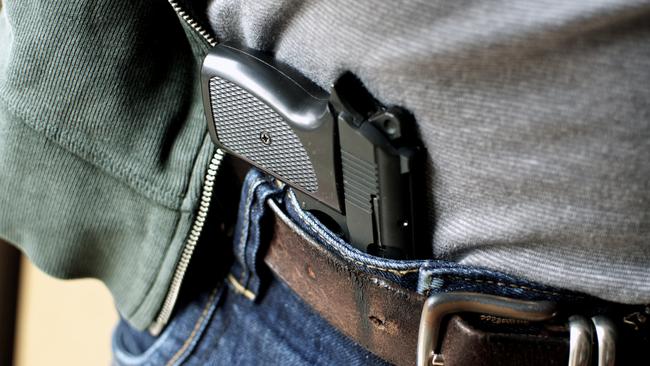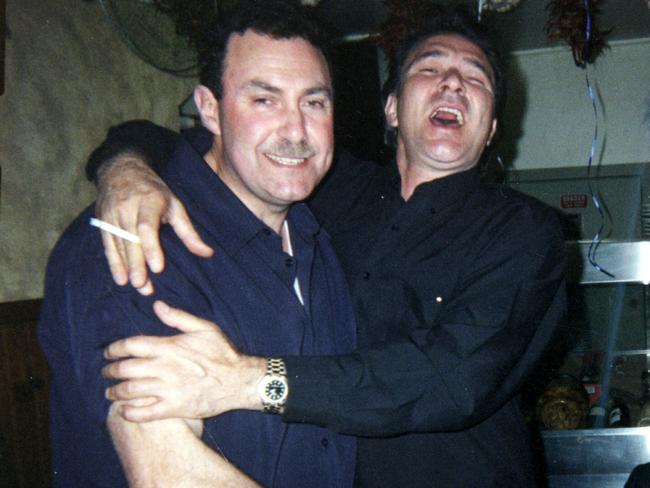Russian gangsters marked for deportation in 2000s run amok in Melbourne
Two men linked to Melbourne’s Russian organised crime world were flagged for deportation in the 2000s, but were allowed to remain in the country. They have since been connected to gun-running and drug trafficking.

Police & Courts
Don't miss out on the headlines from Police & Courts. Followed categories will be added to My News.
Two men linked to Melbourne’s shadowy Russian organised crime world have operated for almost 20 years after being marked for deportation.
One of them was entangled in a major recent bust in which a vast cache of guns was uncovered after being buried at a rural Mornington Peninsula property.
The sprawling operation was one of the most significant strikes against alleged Russian organised crime in Melbourne for some years.
The men, regarded as uncompromising operators, are veteran gangland figures around long enough to have once been running mates of gangster Nik Radev, The Bulgarian-born Radev was murdered at Coburg in 2003 at the height of Melbourne’s underworld war.
Radev and the others had conspired to carry out a major armed robbery before police swooped.
Another more senior member of the group shot a man who had turned police informer over the heist.
An underling – one of the men eventually earmarked for deportation – was later found roaming the corridors of a hospital where the wounded man was being treated.
The victim survived a second hit attempt interstate and his sister was threatened by gangsters in her home country in eastern Europe, who warned her he needed to shut-up.
It is unclear why the two lined up to be banished by federal authorities in the 2000s were allowed to remain in the country.

They and their associates have since been linked to gun-running, high-level drug trafficking and major burglaries.
One was recently arrested over a violent home invasion in suburban Melbourne in which a shot was allegedly fired.
The Herald Sun revealed last month that he was to be banished back to eastern Europe in 2007 by then-Immigration Minister Kevin Andrews but that never happened.
The other was allegedly implicated in a sprawling joint organised crime taskforce bust this month which targeted what police described as a significant Russian organised crime syndicate.
Little has been publicly revealed over the years about Russian organised crime activity in Melbourne, compared with some other ethnic-based groups.
They have traditionally been linked to extortion and drug trafficking, particularly in the southern suburbs.
One police source said they were not the insular crews people may think.
“They’ll do business with whoever they have to if there’s an earn,” he said.
One former underworld figure said Russian organised crime figures were known for being low-profile and disciplined.
“They’re feared. They normally operate on their own. They don’t want to be on the front pages of the papers,” he said.
“They don’t deal with the riff-raff. They look after their own in prison.”
That man did note that part of their intimidation factor appeared to be informed by depictions of stereotypical Russian criminals such as those in the Denzel Washington film Training Day.
“It’s partly because of the Hollywood stuff,” he said.
Police say last week’s bust by the Joint Organised Crime Taskforce had its genesis in the discovery by Australian Border Force officers of a fake Dutch passport in the international mail system.
It was tracked to a delivery address at a business in Burwood.
It was later allegedly delivered to a man with links to Russian organised criminals.
Police suspect the gangster was attempting to use the counterfeit item to flee the country to avoid an upcoming date with court.
His arrest led officers to several properties at Albert Park, Humevale, Tyabb and North Fitzroy, where they seized over 40 firearms, various explosives and illicit drugs.
Excavators were used to dig up six storage cases from the Tyabb property and PVC pipe hidden underground in Humevale.
Almost $1m cash was also seized.



